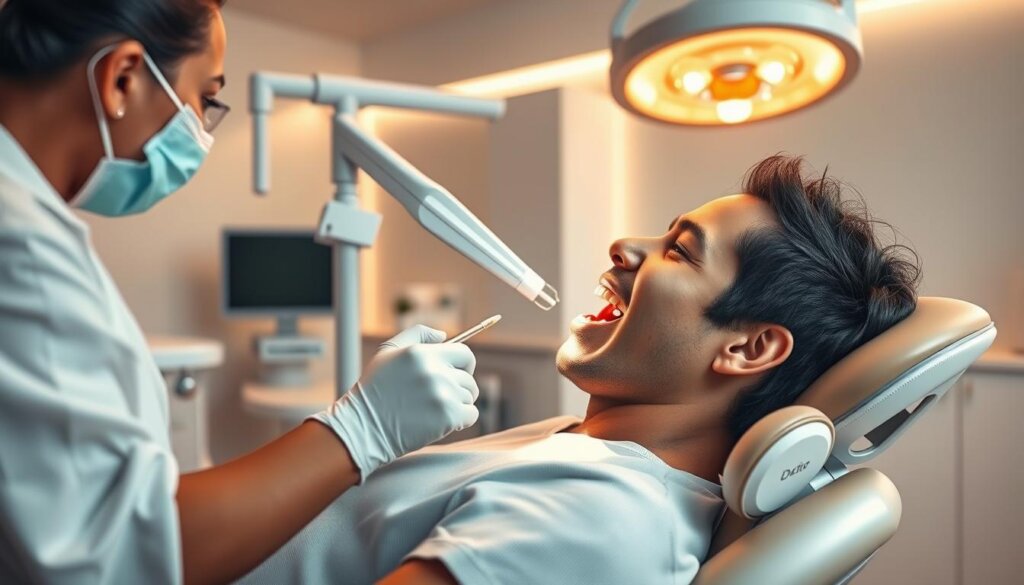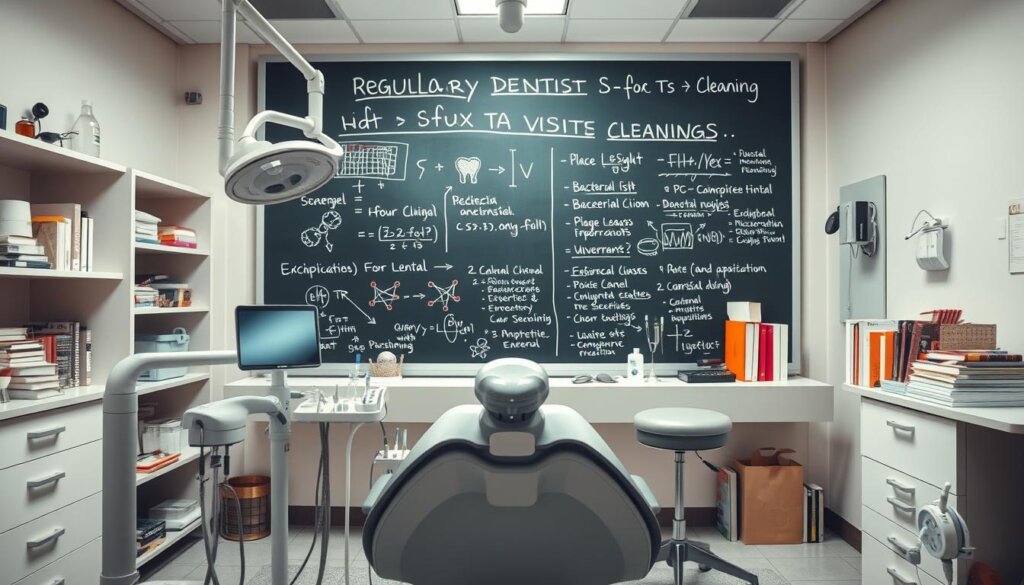Six-Month Dental Cleanings: Why Dentists Insist
Health experts always say: get a dental check-up every 6 months. This advice is a key guideline from dentists everywhere. Even so, a study shows more than 100 million Americans skip this yearly. Making these visits a priority shows how critical regular dental cleanings are. They’re not just for keeping your smile bright. Dentists want to catch problems early, before they get worse.
These visits help get rid of plaque and find gum disease early on. Dentists stress the need for these cleanings to prevent cavities and gum issues. Going to your dentist every 6 months can lead to better health. It can also keep you from needing bigger dental procedures later.
Key Takeaways
- Dental check-ups every 6 months are key to early detection and prevention of oral diseases.
- Regular dental cleanings play a significant role in maintaining not just oral health but overall health.
- Dentist’s advice on dental visits often focuses on avoiding future dental complications and health expenses.
- The consistency of dental visits leads to better oral health outcomes and potentially fewer dental interventions.
- Ignoring biannual dental appointments could result in more extensive and costly dental treatments in the future.
Understanding Dental Cleanings
Dental cleanings are key for good oral health and keeping dental diseases away. They include checks by dental pros and different cleaning types, tailored to your oral health needs. How often you should get dental cleanings varies, based on what the experts suggest and your own health.
What Is a Dental Cleaning?
A dental cleaning helps keep your teeth clean by getting rid of plaque and tartar. This stops cavities, gingivitis, and serious gum diseases from happening. Besides cleaning, your teeth get polished to remove stains and treated with fluoride for extra protection.
The Role of the Dental Hygienist
Dental hygienists lead the charge in doing dental cleanings. They’re not just about cleaning teeth; they teach you how to take care of your mouth too. They check and track the health of your gums and teeth, offering advice on how to avoid dental problems.
Types of Dental Cleanings
There are a few different dental cleanings, each with a special focus:
- Prophylaxis: A general cleaning for people without serious gum disease. It’s the usual type of dental cleaning.
- Scaling and Root Planing: This deep cleaning is for those with gum disease. It cleans the roots and beneath the gum line.
- Periodontal Maintenance: After treating gum disease, this cleaning helps keep the mouth healthy and stops the disease from coming back.
Knowing about these cleaning types helps you figure out if you need specialized dental visits or a particular cleaning for your dental health.
Benefits of Regular Cleanings
Going to the dentist twice a year is key for more than just a bright smile. It’s vital for good overall mouth health. Regular cleanings help prevent issues like cavities and gum disease by removing plaque and tartar. These visits keep your teeth and gums healthy and help avoid bigger, more expensive problems later.
Prevention of Cavities and Gum Disease
Stopping cavities and gum disease starts with regular dental cleanings. Plaque buildup can cause serious mouth issues if not handled. Cleanings get rid of plaque and keep tartar from forming, helping prevent decay and disease.
Maintaining Optimal Oral Health
Visiting the dentist every six months does more than prevent problems—it helps keep your mouth in top shape. Professional cleanings get to places daily brushing and flossing might miss. This care is crucial for healthy gums and strong teeth, improving your overall mouth health.
Inspirations for Better Oral Hygiene Habits
Dentists do more than just clean; they teach important self-care during visits. By showing how to brush and floss correctly, they help improve your daily care routine. This advice strengthens your habits, helping you take better charge of your mouth health. Regular feedback motivates you to keep up and improve your oral care.
The Science Behind the Six-Month Schedule
The best time for dental check-ups is based on solid science. Dentists suggest seeing them every six months for exams and cleanings. This advice is supported by a lot of scientific research on how often you should visit the. Visiting every six months is key for a good cleaning and to spot any dental problems early.
Bacteria grow fast in your mouth, which is why visiting the dentist every six months is a must. Dentists keep an eye on this growth and know when bacteria start to come back. Studies show harmful bacteria can regrow in just three to four months. So, a check-up every six months helps stop them before they cause damage.
Keeping up with these visits matches how certain bacteria live and grow. Regular visits help stop the growth of bad bacteria. Breaking up this growth regularly is important. It helps keep your mouth healthy and prevents gum diseases.
The Cost-Benefit Analysis
Looking at dental insurance and financial planning for oral health, we see big cost savings with regular cleanings. These savings point out how important regular dental care is.
At first, paying for regular dental cleanings might not seem worth it. But, after a closer look, it’s clear they’re an investment in long-term health and money-saving. By getting cleanings to prevent issues, you avoid paying more for dental work later.
Long-Term Savings vs. Short-Term Costs
When you compare the up-front cost of a dental cleaning to the money saved from dodging big dental problems, the savings are huge. Not getting serious tooth or gum problems means less money spent fixing them.
Insurance Coverage and Cleanings
Many dental insurances fully cover biannual cleanings. They do this because regular visits prevent costly dental problems. It shows just how effective these check-ups are.
| Expense Type | Without Regular Cleaning | With Regular Cleaning |
|---|---|---|
| Initial Visit Cost | $200 | $100 |
| Preventive Care Coverage | 0% | 100% |
| Major Dental Work | $1500 | $0 |
| Total Cost Over 5 Years | $6500 | $1100 |
What to Expect During a Cleaning
Visiting the dentist twice a year is key. Knowing what happens can ease any worry you have. These visits include a deep look at your mouth. This finds and fixes any teeth or gum issues early.
Initial Assessment and X-rays: Your visit starts with a careful check-up. Dentists might also take X-rays at this time. This helps them see problems not visible to the eye. With this info, they make a plan that’s just right for you.
The Cleaning Process Explained: After checking your mouth, the cleaning begins. The dental hygienist removes plaque and tartar that brushing at home can’t get. Every tooth gets cleaned well. Your teeth will be polished too, leaving them smooth and shiny.
Post-Cleaning Care Instructions: Once the cleaning is done, you’ll get advice just for you. This will help keep your mouth healthy until your next visit. The advice may include how to brush or floss better, what products to use, or when to come back.
Knowing these steps can help you see why dental visits are good for you. By going to the dentist twice a year, you help keep your mouth healthy. This is a big part of staying healthy overall.
Special Considerations for Different Age Groups
Dental care changes as we grow. As kids, teens, adults, and seniors, our dental needs shift. It’s vital to tailor dental care to suit every age to keep teeth healthy and avoid future issues. Custom dental plans and timely visits help greatly in preventing and fixing dental problems.
For kids, pediatric dental care makes going to the dentist fun and starts healthy habits early to prevent cavities. Adults need adult oral health maintenance to deal with gum disease and fix damage from bad habits or neglect. Seniors confront unique challenges like increased decay from medicines, which calls for specialized care and more frequent dental visits.
Proper dental care, customized for each stage of life, improves oral health and sets up good habits. These habits reduce the need for big dental treatments later on.
The table below shows what each age group needs to focus on in dental care:
| Age Group | Focus Area | Common Risks |
|---|---|---|
| Children | Preventive measures, Habit formation | Early decay, Misalignment |
| Adults | Oral health maintenance, Disease management | Gum disease, Dental erosion |
| Seniors | Risk mitigation, Medication impact assessment | Dry mouth, Root decay |
Knowing these care differences helps give every patient the best treatment. This improves their life and keeps their teeth healthy for a long time.
Common Myths About Dental Visits
There are many myths around dental care that need to be cleared up by trusted sources. One common belief is about having to visit every six months. This period isn’t set in stone but serves as a guideline for good oral health. It’s important to correct such myths to prevent delays in getting the necessary dental treatments.
Debunking the Every-Six-Month Myth
Many think you must visit the dentist every six months. This advice aims to stop oral diseases before they get worse. But, how often you need to go can change based on your dental health. This shows the need to understand that visit frequency can vary, which is often missed in discussions about oral care.
Misunderstandings About Pain Levels
Many avoid the dentist because they’re scared it will hurt. Yet, pain management in dentistry has gotten much better. Now, there are many ways to make sure dental work is as pain-free as possible. Thanks to things like local anesthetics and sedatives, dental work can now be done with little discomfort.
The Myth of Self-Cleaning Teeth
Some believe that teeth can clean themselves. While saliva does help control bacteria, it’s not enough to stop plaque. Getting your teeth professionally cleaned regularly is key for your dental health. It helps clean spots that brushing and flossing can’t reach. This is a big misconception—that nature alone can keep your mouth clean.
By addressing these myths, we help people understand more. This encourages them to get regular and timely dental care, which can greatly improve public oral health.
The Impact of Lifestyle Choices
People make choices every day that impact their oral health. Knowing how daily habits affect dental health can help individuals make better choices. These choices help keep their mouths healthy.
Diet is very important for keeping your teeth and gums healthy. Smoking, on the other hand, harms your oral health by causing problems like plaque and gum disease.
Diet Choices and Oral Health
Nutritional choices greatly affect your teeth. Diets high in sugar speed up tooth decay. They feed bacteria that produce harmful acids. On the flip side, foods rich in fiber, calcium, and phosphorus protect tooth enamel. They also increase saliva, which fights decay.
- Eating unsweetened dairy products like cheese and yogurt helps lower mouth acidity.
- Fruits and veggies that are high in fiber boost saliva flow. This cleans away food bits and acids.
- Green and black teas fight off bad oral bacteria.
Smoking and Its Effects on Teeth
Smoking severely harms your oral health. It leads to gum disease, tooth loss, and mouth cancers. Smokers also heal slower after dental work. They get more plaque and tartar on their teeth.
- Smoking lowers blood flow to gums, which is vital for healthy tissue.
- It also makes the mouth weaker against infections. This puts smokers at a higher risk of gum diseases.
The Role of Exercise in Overall Health
Exercise, while not directly linked to oral health, supports it. It lowers the risk of heart disease and diabetes, which can affect your gums. Working out reduces body inflammation and boosts the immune system. This creates a healthier mouth environment.
Living a healthier life improves both overall and oral health. Recognizing how lifestyle choices affect dental health is the first step. This leads to lasting, positive habits for a healthy mouth.
How to Prepare for Your Cleaning
Getting ready for dental check-ups is key to making the most out of your cleaning appointments. This prep work not only makes visits quicker but also helps you talk better with your dentist. Here are some tips to make sure you’re ready for your next visit.
Before your dental visit, it’s smart to take good care of your mouth. Brushing and flossing well can help your cleaning go smoothly. Here’s a checklist to help you prepare:
- Brush your teeth twice a day with fluoride toothpaste
- Floss every day to get rid of plaque where your brush can’t reach
- Try not to eat big meals right before your visit to avoid feeling uncomfortable
Talking effectively with your dentist is very important. Make a list of any questions or concerns you have about your teeth or any planned treatments. Good questions to ask include:
- How can I make my dental health better?
- Are there any dental problems I need to know about?
- How often should I get my teeth cleaned?
Knowing when to book dental cleanings is important for taking care of your teeth. If you’re sick or have a contagious illness, you should reschedule your appointment. This helps keep everyone safe. Also, try to see your dentist every six months for the best dental health.
Following these tips means you’re looking after your dental health well. It also means you’re making smart choices about caring for your teeth.
The Link Between Oral Health and Overall Health
The deep systemic health link to oral health shows dental issues can greatly affect our body’s health. Many studies show this link. They specifically point out how periodontal disease can raise the risk of cardiovascular problems and affect diabetes management.
The link between periodontal disease and cardiovascular risks is due to inflammation caused by mouth bacteria. When these bacteria get into the bloodstream, they can inflame arteries and lead to plaque build-up. These are risks for heart diseases. That’s why keeping teeth healthy is key to preventing other serious health issues.
The relationship between diabetes and dental health is also crucial. Those with diabetes are more likely to get periodontal disease because of poor blood sugar control. This can make gum treatments harder and complicate diabetes care. So, good dental care is essential for controlling and lessening diabetes complications.
This knowledge stresses how vital regular dental visits are as part of total health care. Taking care of our teeth is about more than just looks—it plays a huge role in avoiding diseases.
Sticking to good oral hygiene practices can protect us from dangerous systemic diseases. This can improve our life’s quality and extend our health over the years.
Signs You Need to Visit Your Dentist Sooner
It’s key to know the early signs of dental problems for good oral health. Small changes might mean you need a dentist visit sooner. Acting fast on these signs can stop bigger problems.
Recognizing Tooth Sensitivity
If hot, cold, or sweet stuff makes your teeth hurt suddenly, pay attention. This discomfort could be the first hint of dental issues. It’s a sign to see your dentist.
Warning Signs of Gum Disease
There are clear red flags for gum disease. Look out for red, swollen gums or bleeding when you brush. Bad breath that won’t go away also points to gum problems.
Changes in Oral Health to Note
Watch for any new or different things in your mouth. Like loose teeth, or changes in how dental devices fit. These things mean you might have dental issues.
Sudden changes in your mouth call for a dentist check-up. Catching gum disease early helps a lot. Seeing your dentist right away is the best move. Early action helps treat problems effectively.
Choosing the Right Dentist
It’s important not just to find someone who can clean your teeth when choosing a dentist. You need to look at their ability to provide full dental care. It’s also key to check the dental office environment. This helps you feel comfortable and trust the dental team.
Factors to Consider When Selecting a Dentist
- Credentials and Training: Check the dentist’s education and training. A good sign is if they studied at top schools and keep learning.
- Experience: Choose a dentist with a lot of experience. They are better at diagnosing and treating different dental problems.
- Patient Reviews: Feedback from other patients can tell you a lot. Good reviews often mean the dentist cares about their patients.
Importance of a Comfortable Environment
A welcoming dental office is key for a good visit. It’s especially important if you’re nervous about dental work. A nice atmosphere can help you relax, making you more likely to follow dental advice.
Dentist Credentials and Experience
Choosing a dentist means ensuring they are skilled and qualified. Checking their credentials and experience helps find someone who can offer the best care for you.
Finding the right dentist means looking at their skills and the office’s comfort level. Focusing on both helps you build a good relationship with your dentist. This is important for keeping your teeth healthy.
Maintaining Oral Hygiene Between Visits
Keeping your teeth and gums healthy between dentist visits is very important. At-home care is key to prevent cavities and gum problems. You should choose the right products for your oral care. This means brushing and flossing daily, and using mouthwash wisely.
“An ounce of prevention is worth a pound of cure, especially when it comes to oral health.”
When setting up your home oral care routine, pick products carefully. It’s essential to find the best toothpaste, toothbrush, and tools for cleaning between teeth. Here are some tips for what to look for:
- Choose toothpastes with fluoride that dental experts approve.
- Pick a toothbrush that feels good in your hand and can clean every spot in your mouth.
- Find floss that goes between your teeth easily without hurting or damaging them.
Flossing and using mouthwash do more than just clean and decrease plaque. Flossing gets to the spots your toothbrush can’t. Mouthwash fights germs, keeps your breath fresh, and gum health on point.
| Practice | Benefits | Usage Recommendation |
|---|---|---|
| Flossing | Removes plaque, reduces risk of gum disease | Daily |
| Mouthwash | Decreases oral bacteria, freshens breath | Twice daily |
| Brushing | Cleans teeth surfaces, prevents decay | At least twice daily |
By following these steps carefully, you’ll keep your mouth healthy. This not only makes your dentist happy but also makes sure your teeth and gums stay strong.
Community Resources and Support
Many community resources are out there to help people learn about and get dental care. These resources help make sure that everyone, no matter how much money they have, can get the dental care they need. Local dental clinics, educational programs, and support groups each play a part in keeping our mouths healthy.
Local dental clinics are key to community oral health. They offer everything from simple cleanings to more involved treatments. These clinics are often where people first go to fight dental diseases and learn how important it is to see the dentist regularly.
Educational programs about oral health aim to spread the word on how to take care of our teeth and gums. They teach people young and old how brushing, flossing, and preventive care can stop dental problems before they start.
Then there are the support groups for dental anxiety. Many people are scared to go to the dentist. These groups help people share their stories, support each other, and find ways to deal with their fears. This makes going to the dentist feel safer and easier.
All these efforts work together to make sure we all have healthier teeth and gums. By teaching, offering direct services, and giving emotional support, they improve dental health for everyone. This doesn’t just help individuals—it makes the whole community healthier.
Conclusion: Prioritizing Your Dental Health
Making sense of all the advice, it’s clear that adopting a dental hygiene routine is key. This isn’t a quick fix but a lifetime promise to improve your long-term oral health. Brushing and flossing daily, along with regular dentist visits, are the foundation of good dental care. These steps help you avoid cavities, gum disease, and other dental emergencies.
Regular cleanings offer many benefits, like catching oral health issues early. This early detection means patients can avoid more serious, expensive treatments later. Plus, good oral health reflects good overall health. Setting up biannual dental appointments keeps your mouth healthy and supports your overall wellness.
We, as dental professionals, push for proactive dental care. It’s important to make regular dentist visits before problems start, not after. While reminders like brochures are useful, it’s up to you to book and keep these appointments. We urge you to see these check-ups not just as another task, but as a vital part of staying healthy.





